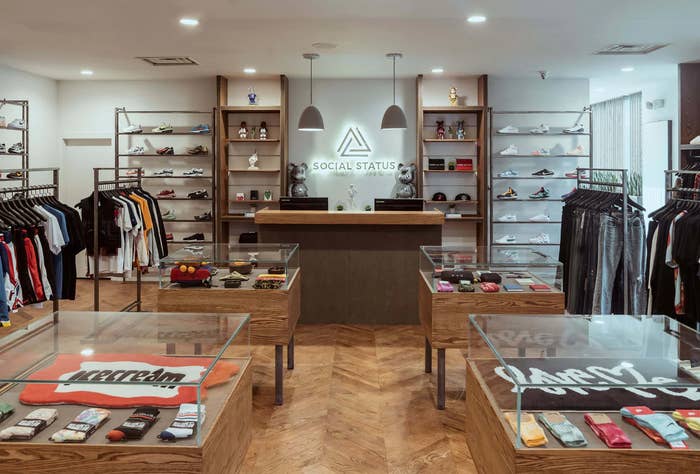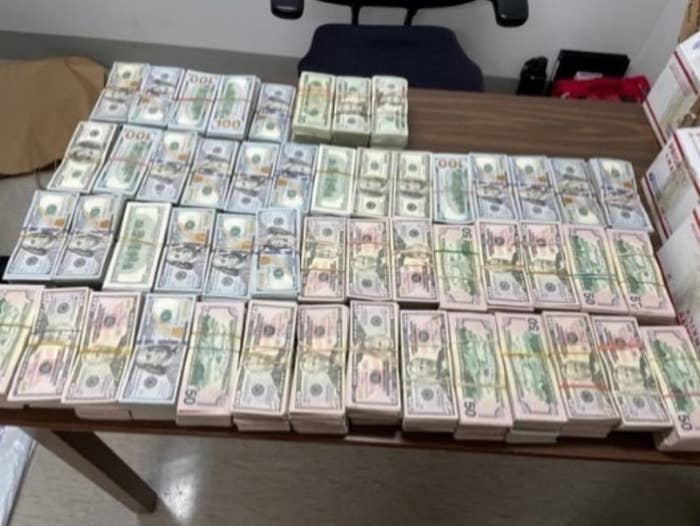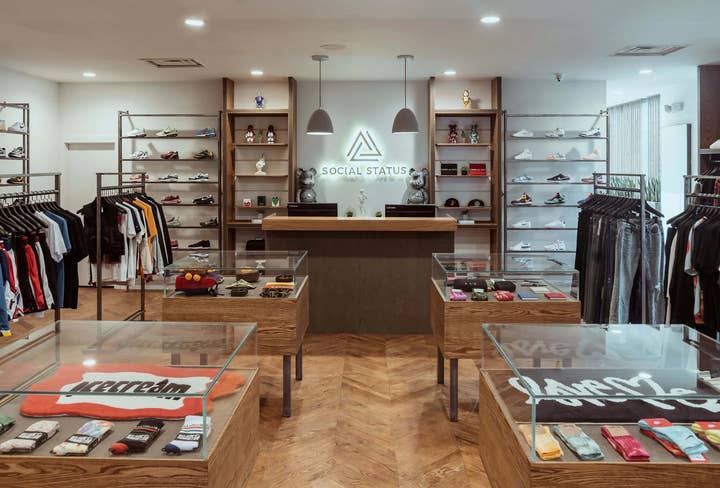
A civil forfeiture complaint filed in a North Carolina district court last Friday alleges that James Whitner, owner of sneaker retail shops including A Ma Maniére and Social Status, has for years resold millions of dollars’ worth of sneakers to Chinese nationals engaged in what prosecutors say is a money-laundering operation. The complaint says that although the business was conducted under the auspices of reselling sneakers and apparel, it rinsed cash from illegal activity and moved it into the banking system.
The forfeiture action centers on $1,199,530 in cash that was seized from the apartment of Whitner’s close friend Antwain Freeman in August 2021. Prosecutors say that money was involved in “an unlicensed money transmitting business involving Chinese money couriers,” Whitner, Freeman, and others.
The complaint is signed and verified by a criminal investigator from the IRS, but Whitner is not facing criminal charges. Whitner’s company the Whitaker Group, which sits on top of his sneaker retail empire, said in a statement to Complex that his businesses have abided by tax law and worked with the government on the matter.
“The recent action by the US Attorney’s Office for the Western District of North Carolina (USAO) comes after significant cooperation and good-faith negotiations on our part. To be clear, while we take the allegations in the complaint seriously, they are unfounded, unrelated to our business or this community and unjustified,” the statement reads. “Our professional inventory management team runs a transparent process built on systems that are both legally compliant and consistent with industry standards. We have also complied with all tax obligations annually.”
The civil complaint mentions that Whitner resold goods produced by an unnamed Oregon-based sneaker company. Whitner’s contract with the company, the complaint says, forbade him from selling its products outside of the U.S. or reselling them to other distributors.
Nike, which is headquartered in Oregon, is Whitner’s largest collaborative partner. The brand regularly works with Whitner’s stores on special-edition releases, the kind that are sought after and resold on the secondary market for well over their suggested retail price. This year alone, Nike plans to release 12 different sneakers in collaboration with Whitner’s stores.
Nike did not respond to a request for comment. The statement from the Whitaker Group implies that Nike has stood by the retailer during the course of the investigation.
“We disagree with the USAO’s allegations concerning our business and remain appreciative of the extraordinary support our vendor partners have shown and continue to show throughout this process,” the Whitaker Group said in the statement. “Our success has made us an easy target caught in the middle of a US financial and regulatory war with China of which we have no part in.”
The complaint says that Freeman and Whitner colluded with a Chinese money-laundering operation to benefit Whitner’s businesses. Whitner would resell sneakers to a Chinese purchaser, who paid a broker for the product. Chinese money couriers, under the direction of the broker in China, would then collect cash from, “among others, individuals engaged in illegal activity.” The complaint says these couriers were instructed to collect large amounts of money, sometimes from women they believed to be engaged in prostitution. The money moved through these couriers, the complaint says, into the hands of Whitner.
These transactions involving Freeman, Whitner, and others comprised an unlicensed money-transmitting business, according to prosecutors.
In response to the complaint, the Whitaker Group highlighted its work to help people of color tell their stories and said that work was under now attack, despite productive engagement with the US Attorney’s Office.
“We look forward to defending our business and operating model while continuing to proudly serve the communities that have embraced us over the last 20 years,” Whitner’s company said in the statement. “This complaint will not deter us from continuing to tell our stories and build a legacy of excellence and we will continue to vigorously defend our business and all that they contribute to culture, commerce and the community.”
The complaint describes a Chinese national, referred to as “YG,” who distributed and sold sneakers in Asia. YG and Whitner had a business relationship extending back to at least 2016. Prosecutors say that YG delivered large amounts of U.S. currency to Whitner in exchange for sneakers.
“Whitner sold millions of dollars of [the] sneaker company’s products to YG,” the complaint reads. “YG resold the products in China and elsewhere.”
According to the complaint, Freeman helped Whitner move huge amounts of cash involved in his transactions with Chinese nationals. Prosecutors allege that, beginning in 2017, Whitner also had YG make payments to Freeman. These payments were either made at Freeman’s home in New Jersey or at his Manhattan-based branding agency, the Foundation.
Court documents break down the alleged scheme in detail. First, YG would agree to purchase sneakers from Whitner. Then, a broker would receive payment from YG and instruct money couriers to collect US currency from various people around New York City. (One courier, per the complaint, said money was collected from people who “were often prostitutes or engaged in other illegal activity.”)
When the couriers accumulated enough money (often between $50,000 and $100,000), they delivered it to Freeman, prosecutors say. Court documents contain pictures of USPS flat-rate shipping boxes couriers allegedly used to deliver loads of money to Freeman.

The civil forfeiture complaint says that Whitner would initially visit Freeman in New York City and transfer the money back to Charlotte, where Social Status is based. But in 2019, the complaint alleges, he began employing Brinks to transport the money in armored vehicles.
Whitner instructed those involved on how to transfer the money so as to avoid it being flagged by financial institutions, according to the complaint.
Prosecutors say that between November 2017 and April 2022, Whitner’s businesses did more than $32 million worth of transactions with YG. The money was spread out across 255 transactions, with each exceeding $10,000. The complaint says that Whitner did not file the documents legally required for these transactions.
Law enforcement arrested Freeman in August 2021 as he was walking to his office in Midtown Manhattan; he was carrying a backpack and a deposit bag, according to court documents. A search of his apartment turned up the $1.2 million in cash hidden in his closet in USPS boxes.
During a subsequent investigation, the complaint says, law enforcement monitored the movement of another $1,550,000 in unlicensed money-transmitting business activity. Freeman pled guilty to misprision of a felony for his role in the money transfers. Two of the money couriers, brothers Longzhi Zhuang and Longjun Zhuang, were also hit with criminal charges.
While prosecutors say the millions of dollars in transactions were at the behest of his companies, Whitner has not been charged. Details in the civil forfeiture complaint suggest that he knew something was awry in his reselling business.
The complaint describes a “consensually monitored phone call” between Freeman and Whitner that took place in July 2022. Prosecutors say that in that conversation, the two discussed Freeman’s arrest and the seizure of $50,000 meant for a transaction with YG. On that call, Whitner said that he “had a feeling some fishy shit was going on.”


